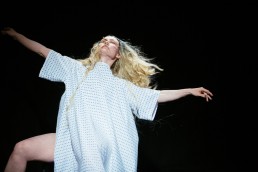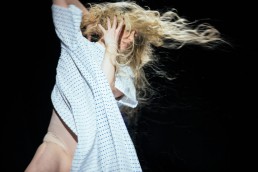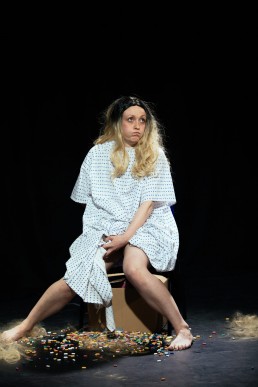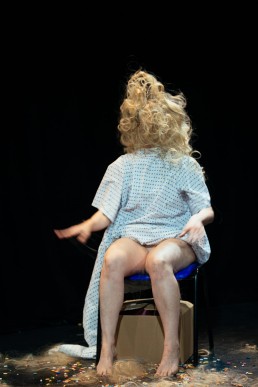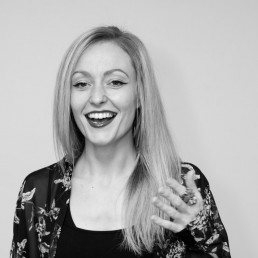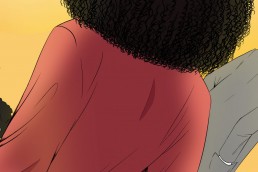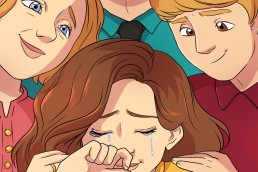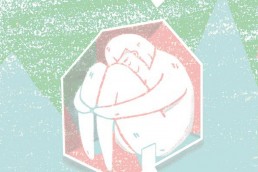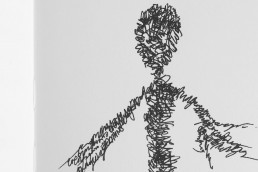Emma Jayne Park
Photography by Jassy Earl
Dancer and theatre-maker Emma Jayne Park shares her story of accidentally discovering mindfulness peaks and troughs when life changed pace and obligations began to meet at difficult intersections.
Should is a dangerous word: a word simultaneously indicating potential and obligation.
In 2015, at aged thirty, I was diagnosed with Hodgkin’s Lymphoma, a form of blood cancer. As a dancer and theatre maker who unashamedly loves and obsesses over her work my life was dominated by the never-ending list of things I should and wanted to be doing.
Cancer threw my entire identity into confusion. As I suddenly was unable to work, the to-do list had been ripped up right in front of me. Yet, I did not have the time to be phased: I had a more urgent project to manage and this one could not wait.
Family, friends, peers and strangers rallied in support and the word should more or less disappeared from my vocabulary. As my home became both my sanctuary and confinement, the only expectation was to focus on getting better.
Occasionally the guilt would slip into my daily life, I should be more organised, I should be using my abundance of unscheduled time to catch up on things, I should reply to the hundreds of messages of support I had received. However, the guilt would be washed away in waves of sickness and fatigue, with assurances from all around me that I had no obligation to anything other than my health.
And now, fortunate to be beyond two years in remission, I am physically ‘better’ but I am very much still in recovery. It is no secret that cancer is life changing and many articles you read will mention the sensation of clarity when faced with your own mortality. Recovery is truly a gift – not everyone is given a second chance at life.
What is rarely discussed is the expectation that this brings. It took less than a week for should to creep back into my world, except it has now found an equally repressive partner in crime: should not.
‘You should not be doing too much.’
‘You should not be wearing that headscarf anymore.’
‘You should not be worried about the weight gain.’
‘You should not be pushing yourself too hard.’
‘You should not be getting worked up about that’
Often followed by ‘you should just feel happy to be alive’.
The phrase ‘getting back to normal’ is dangled like a carrot whilst the title survivor is bestowed with great pride: both trying to erase the past three years of illness whilst creating a title that conflates my identity solely with overcoming this illness.
‘You should just be happy to be alive.’‘At least you are alive.’
I am.
I am alive.
I am lucky to be alive and in spite of the assumption that facing my mortality means I should no longer worry about every day issues. In reality, I care more now about everything than I ever did.
Towards the end of chemotherapy I slept on average eighteen hours a day. When you have such little waking time suddenly you don’t feel grateful to be alive, you feel grateful for the small things. Burning the toast I was having for dinner was infuriating. I know it is ONLY toast but for me it was the only thing I could bare to eat and often the only meal in my six-hour day. If it was not perfect, where was the joy in eating it? If this is how I felt about toast, you can only imagine how I felt about my work.
Life is not the thing you fight cancer for, you fight cancer for a quality of life.
I wanted to live so I can contribute to the world around me, I wanted to live so I can feel passionately about things, I wanted to live for my purpose: in my case my work and the people around me.
In the inspiration generation, I think we make huge assumptions of how we should feel. Life changing clarity definitely brings mindfulness but mindfulness does not always equate to a sense of overwhelming calm. Being mindful means noticing the things around you and responding to them – these responses can include anger, frustration, worry and despair.
Equally they can include enthusiasm, excitement, stimulation and bucket loads of laughter.
Presently, I feel an overwhelming pressure to experience something meaningful from the quick share of an inspirational quote instead of dedicating time to developing long term practices and collaboration in the knowledge that meaning will come from the time invested.
As I am repeatedly told that I should simply be grateful to be alive I cannot help feeling that this is an attempt to make me ignore all of the small things that actually make me feel alive. Although I am far better at resting than I ever was prior to my illness, I am also now hyper aware of the world around me and seemingly small gestures affect me more than ever. So, with that, I invite everyone to sweat the small stuff more each day, pay attention to detail and not forget that quality of life is what makes it worth living, not just being here.
Emma will be performing work inspired by the issues discussed in this article at Edinburgh Fringe as part of the Dance Base Programme, for ticket information, click here.
Emma Jayne Park
Cultured Mongrel is the creative handle for the artistic practice of Emma Jayne Park; dancer, theatre maker, collaborator and arts activist. ‘High octane… energetic, witty and playful’ (The Skinny), she brings together unique combinations of skilled artists on a project basis to create uncompromising performance that draws attention to the critical issues facing society today. Emma is Associate Artist with the Scottish Mental Health Arts Festival.
Author photograph by Suzanne Livingstone

